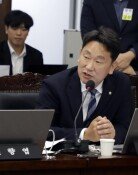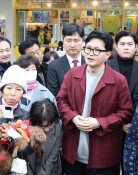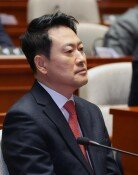[Editorial] Government¡¯s weak-kneed posture toward Hyundai
[Editorial] Government¡¯s weak-kneed posture toward Hyundai
Posted January. 10, 2001 20:33,
A sequence of stumbling blocks is ahead for the Hyundai Group, South Korea's largest conglomerate. After one of its affiliates managed to ride out a financial crisis thanks to a government bailout, further turbulence prompted the government to offer even more aid. The question is why the government allows itself to be pushed around.
Out of six enterprises whose bonds are to be taken over by Korea Development Bank (KDB), four are Hyundai Group affiliates, namely Hyundai Electronics Industries (HEI), Hyundai Merchant Marine, Hyundai Engineering & Construction (HEC) and Korea Development Co. The other two enterprises included in the list are not considered significant, and their inclusion may in fact be intended to divert attention from the government's rescue measures for Hyundai.
The system under which the state-run bank injects public funds into nonviable enterprises runs counter to market principles and the spirit of the ongoing financial restructuring. Even before businesses made self-rescue efforts aimed at reducing their debts, the KDB hurriedly offered bailout measure. Ironically enough, HEI came up with a set of requests to reduce additional interest and extend the period for rollovers from one and a half years to two.
In spite of this, the government is highhandedly demanding that other companies carry out their structural reforms without such treatment, thus raising doubts over the fairness of the government's policy implementation. Meanwhile, Micron Technology of the United States filed a compliant with the World Trade Organization (WTO) alleging that the KDB shouldn't be allowed to take over the HEI's bonds. This raised fears of an imminent trade dispute between Korea and the United States.
With the sharp drop in semiconductor prices to the level of $2.50 for 64-mega DRAM chips, HEI's flagship product, the bond purchase actually means a loss to the company. Amid its deteriorating income structure, the amount of the company's total debt reaches 11.5 trillion won, 4.3 trillion of which will mature within the year. Despite this heavy debt burden, the electronics firm has failed to take bold self-help measure such as selling off its assets. Instead, it has engaged in brinkmanship negotiations with the government with the aim of exacting preferential measures by exploiting the potential economic turmoil that would certainly stem from its bankruptcy.
HEC's insolvency due to a liquidity crisis, we remember, resulted in stock price plunges on several occasions. But even after receiving special treatment from the government, it has yet to emerge from the quagmire. Previously, HEC got a boost from the state-run Korea Land Development Corporation's takeover of its Sosan Farmland. Now it has again benefited from the KDB's preferential takeover of its bonds.
The Hyundai Asan Corporation, which runs the Mount Kumgang tours, is now requesting that the government license it to open a casino on its cruise ships to make up for the losses suffered from operating the tours.
As matters now stand, the government is trying to have another conglomerate take over HEI and is even considering returning the debt-ridden firm to LG, former owner for the company.
This attests to the mistakes the government made in promoting its so-called "big deals," under which LG Electronics was forcibly conceded to HEI. Ideally, Hyundai should be left to work out its own solutions to the problems it is now experiencing.
A lesson should be learned from the Daewoo Group incident, in which public funds were belatedly poured in but still couldn't save the conglomerate from going belly up. There is simply no reason for the government to extend the lives of the moribund enterprises through special favors.







